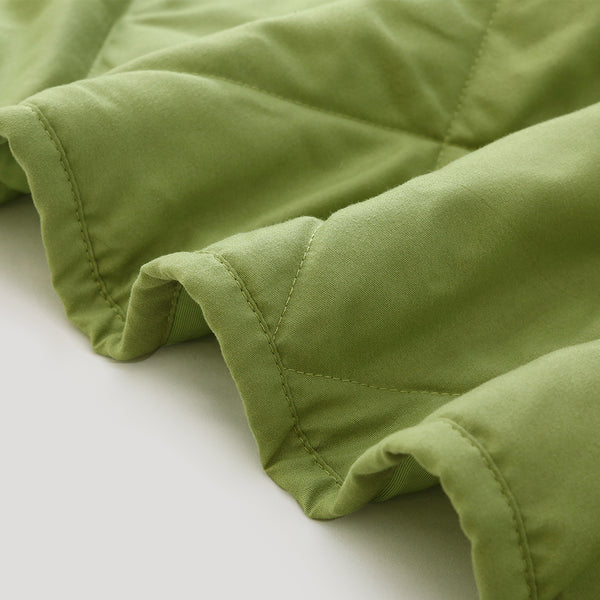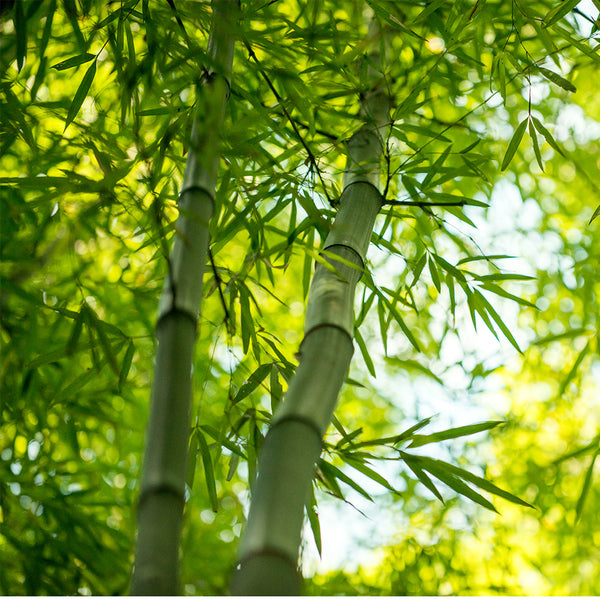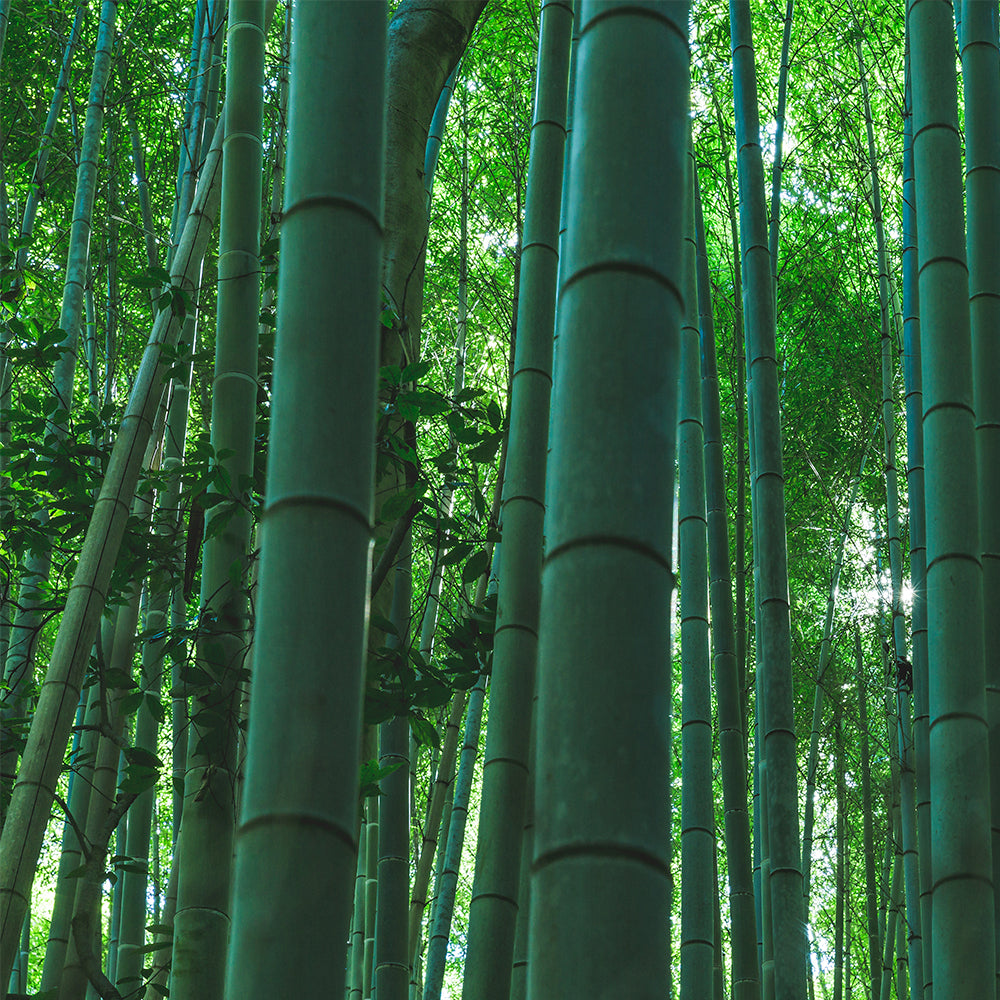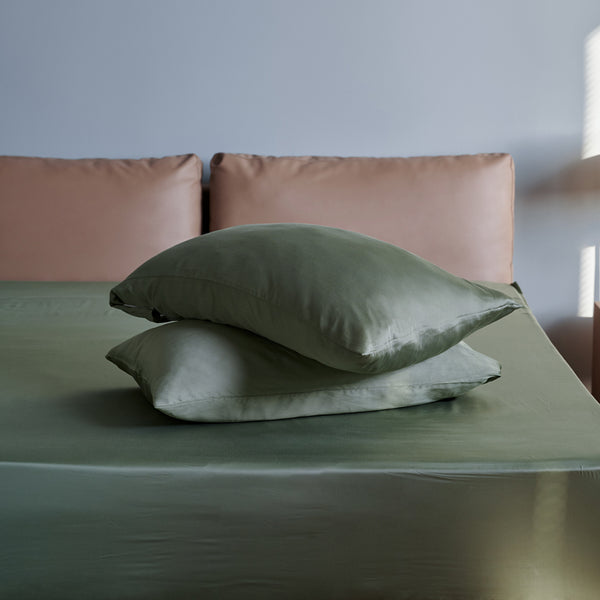Bamboo-based fabrics have emerged as a frontrunner in the quest for the perfect set of eco-friendly, soft-to-the-touch bed sheets. But as you dive into sustainable textiles, you might stumble upon a seemingly perplexing choice: Bamboo Rayon vs Bamboo Viscose.
Are they twins in the eco-textile world, or is there an underlying difference that could sway your decision? This article will guide you through the bamboo textile maze, ensuring you're well-equipped to make an informed choice.
Bamboo Rayon vs Bamboo Viscose: Clearing the Air

At first glance, "Bamboo Rayon" and "Bamboo Viscose" might denote distinct textile categories. However, the truth is much simpler. These terms are often used interchangeably across regions to describe the same bamboo-derived fabric. Here's what you need to know about each:
What Exactly is Bamboo Rayon?
Bamboo Rayon is a semi-synthetic fiber that's created by transforming bamboo pulp into a soft, luxurious fabric. This process gives Rayon its silky-smooth texture, similar to silk, but at a lower cost and with a smaller environmental impact.
It's important to note that the 'Rayon' label can apply to any plant-based fabric, so the specific mention of 'Bamboo Rayon' is key to identifying the textile's bamboo origin.
Understanding Bamboo Viscose
Much like its Rayon counterpart, "Viscose" refers to a fabric derived from plant cellulose, which, in this context, is bamboo. The term stems from the viscous solution of bamboo cellulose used in the fabric's production process.
Viscose shares Rayon's eco-friendly and cost-effective characteristics, offering a silky feel that rivals natural silk. Labels specifying "Bamboo Viscose" ensure the fabric in question hails from bamboo sources.
The overlap between these terms arises from geographical preferences in terminology, with "Rayon" being favored in the United States and "Viscose" finding its stronghold in other parts of the world. Despite the different terminologies, the essence of the fabric remains the same: a plant-based, eco-conscious alternative to traditional textiles.
The Significance of Bamboo Content
You might notice a percentage indicating the bamboo content when shopping for bamboo fabrics. This figure is pivotal as it highlights the purity of the bamboo fabric.
Pure bamboo offers a distinct tactile and aesthetic experience compared to blends that might include cotton or synthetic fibers. Aiming for 100% Bamboo Rayon or Viscose is advisable for those prioritizing luxury and environmental benefits.
Pure Bamboo Fabric vs Bamboo Blends

The decision between pure bamboo fabrics and bamboo blends boils down to personal preference and priorities:
- Pure Bamboo: Offers unparalleled softness and luxury, standing as a testament to eco-friendly practices. Pure bamboo fabrics are naturally antimicrobial and moisture-wicking, making them a superior choice for sensitive skin.
- Bamboo Blends provide a cost-effective alternative while retaining some of the bamboo's benefits. However, blends may offer different softness or environmental advantages than 100% bamboo fabrics.
Caring for Bamboo Fabrics: Ensuring Longevity
Proper care is essential when investing in Bamboo Rayon or Viscose fabrics to maintain theirness and durability over time. Unlike conventional textiles, bamboo fabrics require gentle handling during washing to preserve their fiber integrity and luxurious feel. Here are some critical tips for care:
- Wash Temperature: Cold water is best for bamboo fabrics to prevent shrinkage and maintain fiber strength.
- Drying Method: Air drying is recommended. If using a dryer, opt for a low-heat setting to avoid damaging the fibers.
- Ironing: Use a low heat setting if necessary. Bamboo fabrics generally have a smooth texture that minimizes the need for ironing.
- Avoid Harsh Chemicals: Harsh detergents can break down the fibers. Choose mild, eco-friendly detergents for cleaning.
Following these guidelines will extend the life of your bamboo textiles, ensuring they remain a cozy and sustainable part of your home for years to come.
Environmental Impact: Beyond the Fabric
The conversation around Bamboo Rayon vs Bamboo Viscose isn’t just about comfort and aesthetics; it also involves the environmental impact of these materials. Bamboo is a beacon of sustainability in the textile industry due to its rapid growth and minimal needs. It doesn’t just consume less water than cotton; it also improves soil quality and absorbs carbon dioxide, contributing positively to the battle against climate change.
Choosing bamboo fabrics is a step toward reducing our ecological footprint. By selecting products made from 100% bamboo, consumers support sustainable agricultural practices and help decrease reliance on synthetic fibers, often derived from petroleum, which can take centuries to decompose.
Innovation in Bamboo Fabric Production

The industry's approach to creating Bamboo Rayon and Viscose continually evolves, with a growing focus on reducing chemical use and improving sustainability. Innovative production methods aim to capture and recycle water and solvents, minimizing environmental harm. These advancements not only enhance the eco-friendliness of bamboo fabrics but also set a standard for producing other textiles.
As technology progresses, the gap between eco-conscious manufacturing and high-quality textiles narrows, offering consumers the best of both worlds: luxurious fabrics that don’t come at the Earth’s expense.
Consumer Awareness and Demand
As awareness of environmental issues grows, consumers increasingly seek products that align with their values. This shift in consumer behavior will likely increase demand for sustainable textiles like Bamboo Rayon and Viscose. Brands prioritizing green manufacturing processes and transparent supply chains will likely surge in popularity, driving further innovation in the sector.
Challenges and Opportunities
Despite the optimistic outlook, challenges remain in the quest for fully sustainable textile production. Issues such as ensuring fair labor practices and further reducing the environmental impact of manufacturing processes are at the forefront. However, these challenges also present opportunities for innovation, collaboration, and improvement, paving the way for a more sustainable future.
Shop Zonli 100% Bamboo Viscose Fitted Sheets and Pillowcases
More Wrinkle-Resistant
Zonli Fitted bamboo sheets are designed with elastic edges that hug the mattress tightly, creating a smooth and taut surface. This tight fit helps to minimize movement and shifting of the fabric during sleep, reducing the likelihood of wrinkles forming. In contrast, many flat sheets, which are simply draped over the mattress, may bunch up or slide around more easily, leading to creases and wrinkles.
Perfect 300-TC Fabric
Indulge in the perfect blend of durability and softness with our 300-TC bamboo fabric. This thread count strikes the ideal balance, providing a dense yet plush feel that promises a comfortable and luxurious sleep experience night after night.
Inexpensive
Enjoy premium quality bedding at an affordable price point with our bamboo fitted sheets and pillowcases. Despite their luxurious feel and exceptional performance, our bamboo bedding remains budget-friendly, allowing you to indulge in comfort without breaking the bank.
99% Anti-Bacterial
Rest easy knowing your sleep environment is cleaner and more hygienic with our bamboo bedding. Crafted with bamboo fabric that is 99% anti-bacterial, our fitted sheets and pillowcases offer superior protection against bacteria, ensuring a fresh and healthy sleeping environment.
Cleaner Than Other Bamboo Fabric
Our unique sateen weave enables us to use fewer yarns, enhancing breathability in Zonli bamboo sheets and pillowcases. As a result, you can wash them about half as often as your regular sheets.
30-Day Free Trial
Zonli provides a 30-day free trial for our 100% bamboo viscose bedding. We're so confident in the superior performance of our bedding that we invite you to try it for yourself, completely hassle-free.
FAQs
Is there a difference between Bamboo Rayon and Bamboo Viscose?
No, there is no difference between Bamboo Rayon and Bamboo Viscose; they are two names for the same material. This naming difference arises from regional preferences in terminology. Both refer to a soft, sustainable fabric derived from bamboo.
Why choose 100% Bamboo Viscose or Rayon?
Choosing 100% Bamboo Viscose or Rayon ensures you're getting a luxurious, environmentally friendly, and gentle product on the skin. These fabrics are known for their durability and moisture-wicking properties, making them ideal for sensitive skin. Additionally, opting for 100% bamboo supports sustainable agricultural practices.
Can Bamboo Viscose blend with other fabrics?
Yes, Bamboo Viscose can be blended with other materials, such as cotton, to create less expensive yet still soft and durable fabrics. However, blending can dilute some of the unique benefits of pure bamboo, such as its antimicrobial properties and superior softness. It's essential to consider your priorities when choosing between pure bamboo and bamboo blends.
Conclusion: Making the Informed Choice
The journey through Bamboo Rayon and Bamboo Viscose reveals that choosing these two fabrics is less about picking between distinct options and more about understanding their value. Both represent a shift towards more sustainable, comfortable, and skin-friendly textiles, surpassing traditional materials in quality and environmental impact.
As consumers become more aware of the importance of sustainable choices, bamboo fabrics are a prime example of how innovation and eco-consciousness can go hand in hand. Whether opting for Bamboo Rayon or Viscose, the decision supports a greener future and brings a touch of luxury into our lives.



2 comments
I read that the process of making bamboo pulp into Viscose bamboo sheets requires heavy duty chemicals and is not environmentally friendly.
Thank you for this informative comparison between bamboo rayon and bamboo viscose! The detailed breakdown of their differences and benefits has greatly enhanced my understanding. I appreciate how you highlighted the eco-friendly aspects and the comfort they offer. This post is incredibly helpful for anyone looking to make informed decisions about sustainable fabric choices. Keep up the excellent work!
Feel free to adjust it to better match your style or specific thoughts!